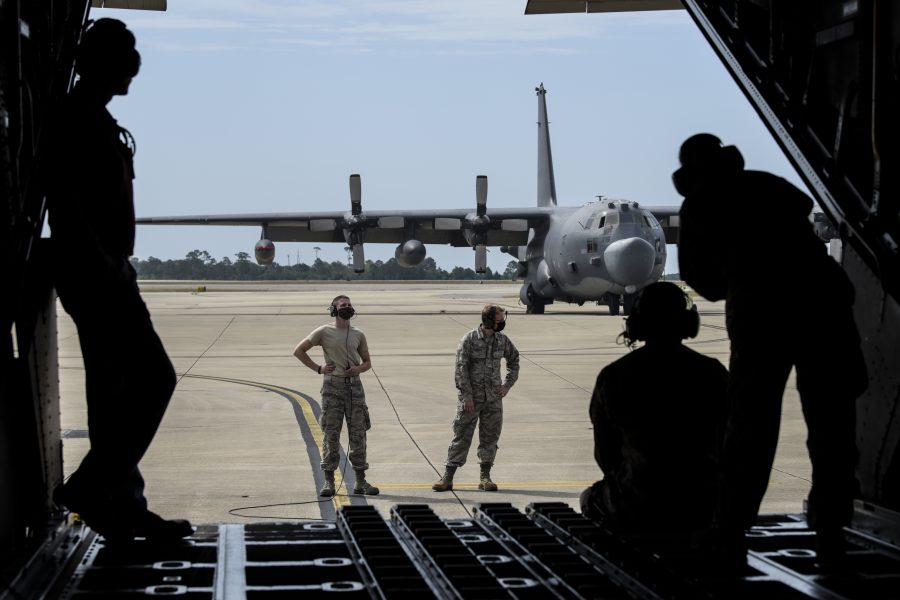AURORA, Colo.—Eight Airmen are testing a new training program at Hurlburt Field, Fla., that combines cultural awareness, cross-cultural negotiation and communication, and the nuts-and-bolts skills of setting up air operations overseas.
The first-of-its-kind, three-week course seeks to enable multi-capable, culturally literate Airmen who the Air Force and the wider military may depend on in a future conflict.
“You typically hear ‘multi-capable Airmen’ as Airmen who can work more than one Air Force Specialty Code,” Walter Ward, a retired Air Force colonel and head of the Air Force Culture and Language Center, said March 6 at the AFA Warfare Symposium. “But in the ACE environment, you’re going to be doing those tasks with your host nation counterparts out there. So language and culture, to be able to get the operational outcomes we want, have to be part of the [multi-capable Airmen] MCA skillset.”
Agile Combat Employment (ACE) is the Air Force’s strategy for deploying small, nimble units of Airmen overseas for launching and recovering aircraft. ACE is meant to complicate an enemy’s targeting process by decentralizing airpower. However, ACE cannot work without collaboration with the host nation, Ward said. That is where the eight Airmen training in Florida come in.
The eight Thai-speaking Airmen are all Language Enabled Airmen Program (LEAP) scholars. LEAP is a program within AFCLC where Airmen and Space Force Guardians who have significant experience in a foreign language can apply to serve as cultural and linguistic experts for their fellow service members. The goal of the LEAP program is to help the Air Force and the broader military overcome linguistic and cultural barriers in order to work more closely with foreign partners. National security experts say America’s allies and partners may mean the difference between victory and defeat in a possible conflict with China.
“If you want to understand how your phone works, you need to understand the operating system of that phone. Culture is the operating system of humans,” Ward said.
LEAP scholars keep their culture and language skills fresh through online mentoring courses or through Language Intensive Training Events—which could take the form of living abroad or of a course like the one at Hurlburt. At the Hurlburt course, a Thai-speaking instructor from the Defense Language Institute taught classes in Thai history, politics, cuisine, religious beliefs, and even the role of Korean and Japanese pop music in Thai culture.
The first week of the course was taught in English as the LEAP Airmen learned techniques in cross-cultural negotiation and communication from instructors at Air Force Special Operation Command’s ‘intercultural skills for engagement’ course. The scholars also learned how to assess and report whether foreign airfields can support military or humanitarian operations. The eight Airmen come from a wide range of career fields, including maintenance, intelligence, and airfield operations.
“You’re typically not using terms like ‘load-bearing capacity’ in a dinner time conversation,” Ward said. “But if you can nail all those things with your Thai partners … look at the velocity we get in a bed-down, the velocity we get in putting combat power into the air.”
The second and third weeks of the course will be taught entirely in Thai as the LEAP scholars brush up on their cultural and linguistic proficiency and practice their cross-cultural negotiation and airfield assessment skills.
The schedule includes role-play sessions where the LEAP scholars conduct pre-deployment site surveys, set up operations centers for humanitarian and disaster relief missions, and even buy fuel for the airfield. Sprinkled in between those sessions are visits to a nearby Thai market, a Buddhist temple, and the Hurlburt chapel kitchen for a Thai cooking session. The goal is to train Airmen who can immediately build bridges with Thai colleagues if the U.S. military ever needs to operate with them in the future.
“There is a speed that a team can work at when it connects and communicates effectively, [and] there’s a speed much less than that for teams that can’t connect and communicate effectively,” Ward said.
AFCLC plans to teach similar courses later this year in Tagalog, Spanish, French, and Russian. Overall, there are about 3,600 service members speaking more than 90 languages who have participated in LEAP.
The Air Force keeps a database of LEAP scholars so they can be called on when needed. For example, if the military needs an airman who can speak Filipino and also help teach Filipino troops how to use unmanned aircraft, then commanders know where to look for that airman. LEAP is highly competitive, with about 1,200 Airmen and Guardians applying every year for a total of 400 slots, Ward said. When AFCLC can join forces with other Air Force organizations like AFSOC through efforts like the Hurlburt course, it is a win-win, he said.
“It really shows a good business relationship within the Air Force where we’re taking best-of-breed capabilities [and]working together to all support our flagship operational concept,” he said. “This particular cohort, it applies to the airfield operating concept. But our imagination is the only limit of where we could potentially spin this.”

